Python 官方文档:入门教程 => 点击学习
目录方法一、使用os模块的system方法方法二、使用os.popen()方法三、使用commands模块,有三个方法可以使用方法四、subprocess模块方法一、使用os模块的s
os.system(cmd),其返回值是shell指令运行后返回的状态码,
int类型,
0--表示shell指令成功执行,
256--表示shell未找到,
该方法适用于shell命令不需要输出内容的场景。
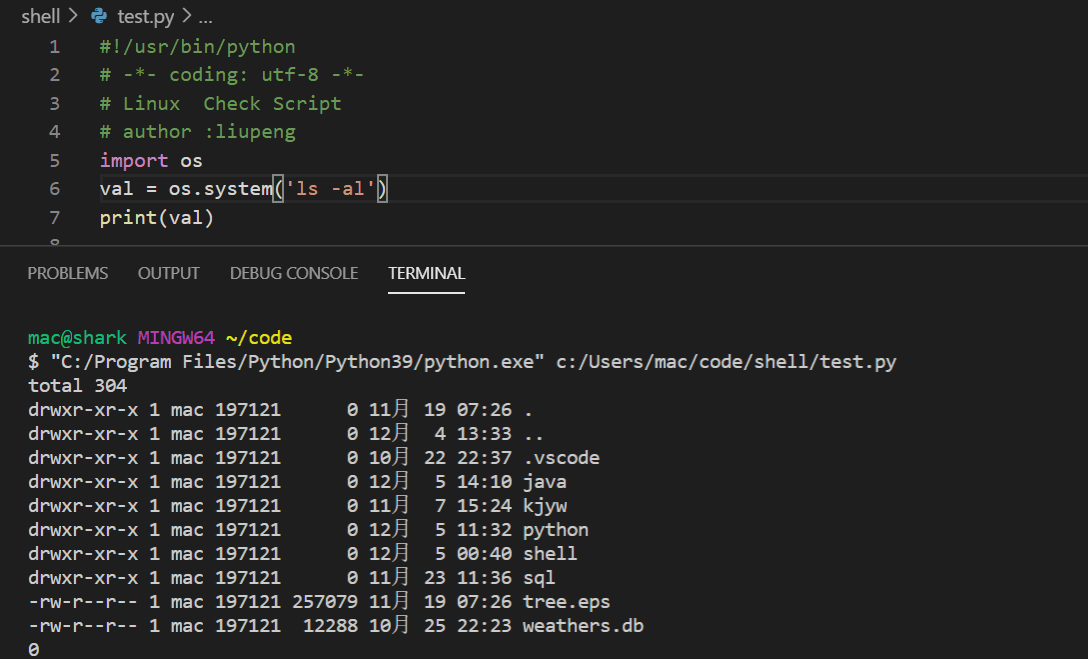
该方法以文件的形式返回shell指令运行后的结果,
需要获取内容时可使用read()或readlines()方法,举例如下:
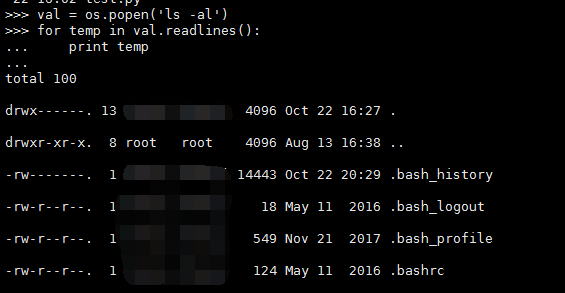
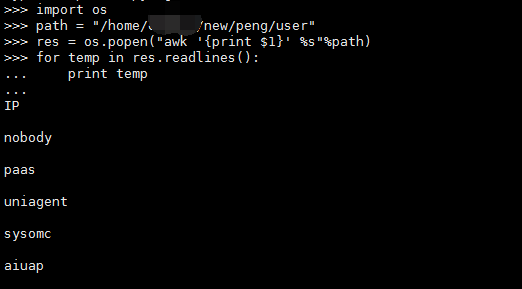
(1)commands.getstatusoutput(cmd),其以字符串的形式返回的是输出结果和状态码,即(status,output)。
(2)commands.getoutput(cmd),返回cmd的输出结果。
(3)commands.getstatus(file),返回ls -l file的执行结果字符串,调用了getoutput,不建议使用此方法
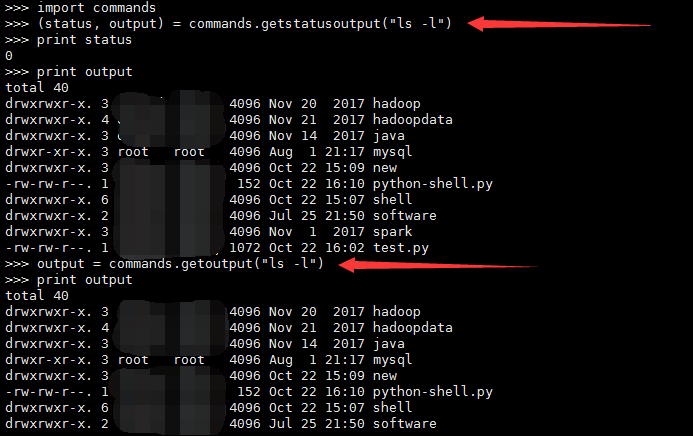

允许创建很多子进程,创建的时候能指定子进程和子进程的输入、输出、错误输出管道,执行后能获取输出结果和执行状态。
(1)subprocess.run():python3.5中新增的函数, 执行指定的命令, 等待命令执行完成后返回一个包含执行结果的CompletedProcess类的实例。
(2)subprocess.call():执行指定的命令, 返回命令执行状态, 功能类似os.system(cmd)。
(3)subprocess.check_call():python2.5中新增的函数, 执行指定的命令, 如果执行成功则返回状态码, 否则抛出异常。
说明:subprocess.run(args, *, stdin=None, input=None, stdout=None, stderr=None, shell=False, timeout=None, check=False, universal_newlines=False)
subprocess.call(args, *, stdin=None, stdout=None, stderr=None, shell=False, timeout=None)
subprocess.check_call(args, *, stdin=None, stdout=None, stderr=None, shell=False, timeout=None)
args:表示shell指令,若以字符串形式给出shell指令,如"ls -l "则需要使shell = Ture。否则默认已数组形式表示shell变量,如"ls","-l"。
当使用比较复杂的shell语句时,可以先使用shlex模块的shlex.split()方法来帮助格式化命令,然后在传递给run()方法或Popen。
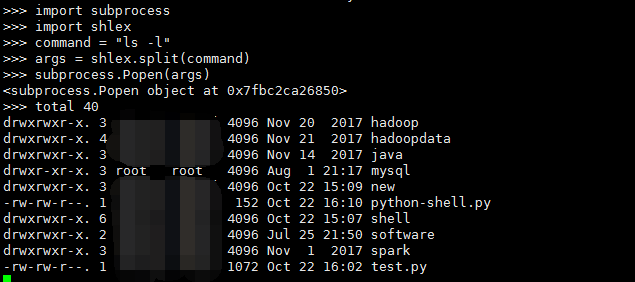
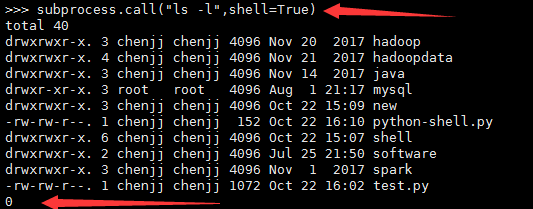
附上Python2.7中的subprocess模块源码供理解(PyCharm查看方法源码,ctrl+左键)。
# Stubs for subprocess
# Based on Http://docs.python.org/2/library/subprocess.html and Python 3 stub
from typing import Sequence, Any, Mapping, Callable, Tuple, io, UNIOn, Optional, List, Text
_FILE = Union[None, int, IO[Any]]
_TXT = Union[bytes, Text]
_CMD = Union[_TXT, Sequence[_TXT]]
_ENV = Union[Mapping[bytes, _TXT], Mapping[Text, _TXT]]
# Same args as Popen.__init__
def call(args: _CMD,
bufsize: int = ...,
executable: _TXT = ...,
stdin: _FILE = ...,
stdout: _FILE = ...,
stderr: _FILE = ...,
preexec_fn: Callable[[], Any] = ...,
close_fds: bool = ...,
shell: bool = ...,
cwd: _TXT = ...,
env: _ENV = ...,
universal_newlines: bool = ...,
startupinfo: Any = ...,
creationflags: int = ...) -> int: ...
def check_call(args: _CMD,
bufsize: int = ...,
executable: _TXT = ...,
stdin: _FILE = ...,
stdout: _FILE = ...,
stderr: _FILE = ...,
preexec_fn: Callable[[], Any] = ...,
close_fds: bool = ...,
shell: bool = ...,
cwd: _TXT = ...,
env: _ENV = ...,
universal_newlines: bool = ...,
startupinfo: Any = ...,
creationflags: int = ...) -> int: ...
# Same args as Popen.__init__ except for stdout
def check_output(args: _CMD,
bufsize: int = ...,
executable: _TXT = ...,
stdin: _FILE = ...,
stderr: _FILE = ...,
preexec_fn: Callable[[], Any] = ...,
close_fds: bool = ...,
shell: bool = ...,
cwd: _TXT = ...,
env: _ENV = ...,
universal_newlines: bool = ...,
startupinfo: Any = ...,
creationflags: int = ...) -> bytes: ...
PIPE = ... # type: int
STDOUT = ... # type: int
class CalledProcessError(Exception):
returncode = 0
# morally: _CMD
cmd = ... # type: Any
# morally: Optional[bytes]
output = ... # type: Any
def __init__(self,
returncode: int,
cmd: _CMD,
output: Optional[bytes] = ...) -> None: ...
class Popen:
stdin = ... # type: Optional[IO[Any]]
stdout = ... # type: Optional[IO[Any]]
stderr = ... # type: Optional[IO[Any]]
pid = 0
returncode = 0
def __init__(self,
args: _CMD,
bufsize: int = ...,
executable: Optional[_TXT] = ...,
stdin: Optional[_FILE] = ...,
stdout: Optional[_FILE] = ...,
stderr: Optional[_FILE] = ...,
preexec_fn: Optional[Callable[[], Any]] = ...,
close_fds: bool = ...,
shell: bool = ...,
cwd: Optional[_TXT] = ...,
env: Optional[_ENV] = ...,
universal_newlines: bool = ...,
startupinfo: Optional[Any] = ...,
creationflags: int = ...) -> None: ...
def poll(self) -> int: ...
def wait(self) -> int: ...
# morally: -> Tuple[Optional[bytes], Optional[bytes]]
def communicate(self, input: Optional[_TXT] = ...) -> Tuple[Any, Any]: ...
def send_signal(self, signal: int) -> None: ...
def terminate(self) -> None: ...
def kill(self) -> None: ...
def __enter__(self) -> 'Popen': ...
def __exit__(self, type, value, traceback) -> bool: ...
# windows-only: STARTUPINFO etc.
STD_INPUT_HANDLE = ... # type: Any
STD_OUTPUT_HANDLE = ... # type: Any
STD_ERROR_HANDLE = ... # type: Any
SW_HIDE = ... # type: Any
STARTF_USESTDHANDLES = ... # type: Any
STARTF_USESHOWWINDOW = ... # type: Any
CREATE_NEW_CONSOLE = ... # type: Any
CREATE_NEW_PROCESS_GROUP = ... # type: Any到此这篇关于python 巡检脚本的项目实践的文章就介绍到这了,更多相关python 巡检脚本内容请搜索编程网以前的文章或继续浏览下面的相关文章希望大家以后多多支持编程网!
--结束END--
本文标题: python巡检脚本的项目实践
本文链接: https://lsjlt.com/news/211121.html(转载时请注明来源链接)
有问题或投稿请发送至: 邮箱/279061341@qq.com QQ/279061341
2024-03-01
2024-03-01
2024-03-01
2024-02-29
2024-02-29
2024-02-29
2024-02-29
2024-02-29
2024-02-29
2024-02-29
回答
回答
回答
回答
回答
回答
回答
回答
回答
回答
0